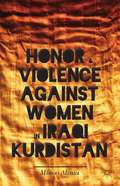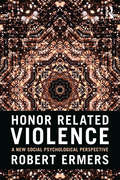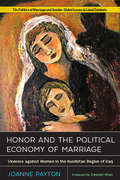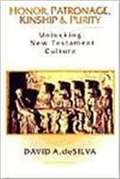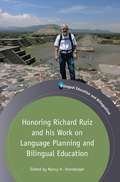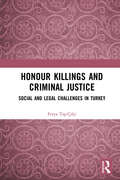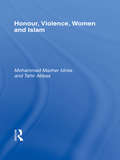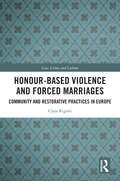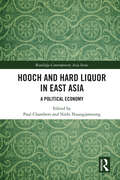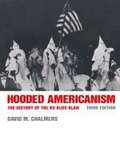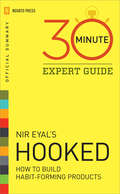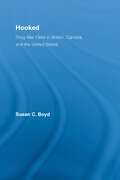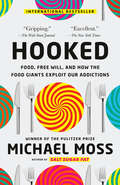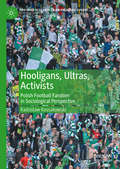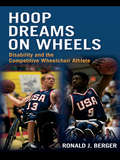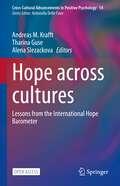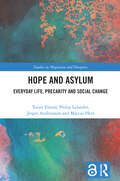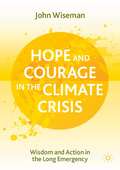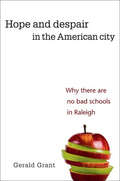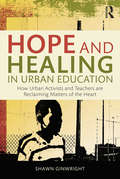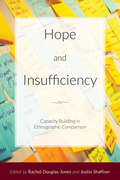- Table View
- List View
Honor And Violence Against Women In Iraqi Kurdistan
by Minoo AliniaThis book examines violence against women in the name of honor in Iraqi Kurdistan, taking an intersectional perspective. It reveals the links between destructive, state-sanctioned honor discourse and notions of manhood as they are shaped by a resistance culture dedicated to the struggle against ethnic oppression.
Honor Related Violence: A New Social Psychological Perspective
by Robert ErmersHonor related violence is generally associated with crimes committed by people from the Middle East and adjacent areas. Perpetrators sometimes justify their deeds saying they ‘had to’ restore their honor. Theorists have argued that men from these populations exclusively correlate honor with the behaviour of their womenfolk, which they use as a pretext to further oppress and dominate women. Due to large-scale migration, western societies have become acquainted with honor related violence and honor killings. In this book, Robert Ermers addresses a number of questions related to honor related violence, including the use of predominantly negative frames regarding the cultural and social background of non-westerners and immigrants. In many publications, including the press, crimes committed by non-western individuals are often attributed to their cultural background rather than specific contexts or circumstances, in contrast to western cases. Vague and insufficiently defined concepts such as ‘honor’ and ‘culture’ strongly contribute to this bias. Honor Related Violence deals with honor and honor related violence, their background and contexts, what honor is, and what it is not. It examines stigma in relation to honor and based upon stigma research, reliably explains, analyses, and predicts honor related violence. The book argues that people all over the world can be stigmatized, excluded and ostracized when they commit misbehavior, and therefore find themselves in a state of dishonor which can lead to honor related violence. A timely intervention into the psychology of honor related violence, this is an essential resource for students and researchers in the fields of social psychology, sociology, law, criminology and anthropology.
Honor and the Political Economy of Marriage: Violence against Women in the Kurdistan Region of Iraq (Politics of Marriage and Gender, Global)
by Joanne Payton'Honor' is used as a justification for violence perpetrated against women and girls considered to have violated social taboos related to sexual behavior. Several ‘honor’-based murders of Kurdish women, such as Fadime Sahindal, Banaz Mahmod and Du’a Khalil Aswad, and campaigns against 'honor'-based violence by Kurdish feminists have drawn international attention to this phenomenon within Kurdish communities. Honor and the Political Economy of Marriage provides a description of ‘honor’-based violence that focuses upon the structure of the family rather than the perpetrator’s culture. The author, Joanne Payton, argues that within societies primarily organized by familial and marital connections, women’s ‘honor’ is a form of symbolic capital within a ‘political economy’ in which marriage organizes intergroup connections. Drawing on statistical analysis of original data contextualized with historical and anthropological readings, Payton explores forms of marriage and their relationship to ‘honor’, sketching changing norms around the familial control of women from agrarian/pastoral roots to the contemporary era.
Honor, Patronage, Kinship and Purity: Unlocking New Testament Culture
by David A. DesilvaDavid deSilva demonstrates that paying attention to these cultural themes opens our eyes and ears to new discoveries and deeper understanding.
Honoring Richard Ruiz and his Work on Language Planning and Bilingual Education
by Nancy H. HornbergerRichard Ruiz has inspired generations of scholars in language planning and multilingual education with his unique orientations to language as a problem, a right and a resource. This volume attests to the far-reaching impact of his thinking and teaching, bringing together a selection of his published and unpublished writings on language planning orientations, bilingual and language minority education, language threat and endangerment, voice and empowerment, and even language fun, accompanied by contributions from colleagues and former students reflecting and expanding on Ruiz' ground-breaking work. This book will be of great interest to both undergraduate and postgraduate students in language planning and multilingual education, Indigenous and minority education, as well as to junior and senior researchers in those fields.
Honour Killings and Criminal Justice: Social and Legal Challenges in Turkey
by Ferya Taş-ÇifçiDespite recent reforms to the Turkish Penal Code, the country retains a high level of honour-based violence. This book analyses the motives behind honour-based violence in Turkey and examines the criminal justice system’s approach to this type of crime. The work takes a socio-legal approach to explore the concepts of honour, patriarchy, and hierarchy, along with the roles of culture and tradition. It also examines how the legal system deals with this phenomenon, focusing on the decisions of the criminal courts in honour killing cases and drawing on prisoner interviews. These analyses show the extent to which the State follows a patriarchal approach when dealing with honour killings and inform recommendations for improving the legal and criminal justice system so as to deter crimes of this nature.
Honour, Violence, Women and Islam
by Mohammad Mazher IdrissWhy are honour killings and honour-related violence (HRV) so important to understand? What do such crimes represent? And how does HRV fit in with Western views and perceptions of Islam? This distinctively comparative collection examines the concept of HRV against women in general and Muslim women in particular. The issue of HRV has become a sensitive subject in many South Asian and Middle Eastern countries and it has received the growing attention of the media, human rights groups and academics around the globe. However, the issue has yet to receive detailed academic study in the United Kingdom, particularly in terms of both legal and sociological research. This collection sets out the theoretical and ethical parameters of the study of HRV in order to address this intellectual vacuum in a socio-legal context. The key objectives of this book are: to construct, and to develop further, a theory of HRV; to rationalise and characterise the different forms of HRV; to investigate the role of religion, race and class in society within this context, in particular, the role of Islam; to scrutinise the role of the civil/criminal law/justice systems in preventing these crimes; and to inform public policy-makers of the potential policies that may be employed in combating HRV.
Honour-Based Violence and Forced Marriages: Community and Restorative Practices in Europe (Law, Crime and Culture)
by Clara RigoniIn the last 20 years, the related phenomena of honour-based violence and forced marriages have received increasing attention at the international and European level. Punitive responses towards this type of violence have been adopted, including ad hoc criminalisation and legislation containing direct references to the concepts of honour, culture, and tradition. However, criminal law-based responses present several shortcomings and have often disregarded the specific needs that victims of such crimes might encounter. This book examines the possibility of using alternative programmes to address cases of honour-based violence and forced marriages. After reviewing previous existing literature, it presents new empirical data. Introducing a case study from the United Kingdom, the book recalls the debate on Sharia Councils and the Muslim Arbitration Tribunal, but examines instead other community-based secular programmes. By comparison, a study from Norway on the work of the National Mediation Agency and the so-called Cross-Cultural Transformative Mediation model is investigated as part of a larger multi-agency approach. Ultimately, in an attempt to reconcile pluralism and the rule of law, the book proposes effective ways to tackle honour crimes based on cooperation and individualisation of the proceedings, and capable of improving women’s access to justice and reducing secondary victimisation. The book will be essential reading for researchers and academics in Law, Criminology, Sociology, and Anthropology and for policy-makers and practitioners working with honour-based violence cases.
Honour: Achieving Justice for Banaz Mahmod
by Caroline GoodeWhen Rahmat Sulemani reported his girlfriend Banaz missing, it quickly became clear to DCI Caroline Goode that something was very wrong. In fact, Banaz had contacted her local police station multiple times before, even listing the names of the men she expected to murder her in a so-called 'honour' killing. Her parents didn't seem worried, but Banaz had already accused them of being part of the plot.DCI Goode's team took on the investigation before they even had proof that a murder had taken place. What emerged was a shocking story of betrayal and a community-wide web of lies, which would take the team from suburban south London to the mountain ranges of Kurdistan, making covert recordings and piecing together cell phone data to finally bring the killers to justice.
Hooch and Hard Liquor in East Asia: A Political Economy (Routledge Contemporary Asia Series)
by Paul Chambers Nithi NuangjamnongLiquor has become a “party” in East Asia – a beverage phenomenon popular among countries throughout the region. But, in fact, each country of East Asia has experienced a different evolution of spirits. Indeed, there is a liquor idiosyncrasy to each country of East Asia. Moreover, hooch is the popular alcoholic beverage for the lower classes while more sophisticated spirits are exclusive to the higher classes.The book examines liquor: moonshine and retail liquor in East Asia. It analyzes the following questions as to why liquor is becoming so popular in East Asia. Why is production of liquor in East Asia becoming so financially lucrative? Why has the production of hooch (moonshine) become so lucrative? In fact, the production and consumption of liquor in East Asian have become crucial as East Asia enters a period of craft liquor.A valuable resource for academics, students, and professionals interested in public policy, history, political economy, consumer goods in East Asia, and the evolution of hooch and hard liquor in East Asia.
Hooded Americanism: The History of the Ku Klux Klan
by David J. Chalmers"The only work that treats Ku Kluxism for the entire period of it's existence. . . . the authoritative work on the period. Hooded Americanism is exhaustive in its rich detail and its use of primary materials to paint the picture of a century of terror. It is comprehensive, since it treats the entire period, and enjoys the perspective that the long view provides. It is timely, since it emphasizes the undeniable persistence of terrorism in American life--John Hope Franklin
Hoodwinked: How Marketers Use the Same Tactics as Cults
by Mara EinsteinPowerhouse marketing expert, narrator of Netflix's Buy Now documentary, shows how today's biggest brands are using cult-like tactics to capture not just your wallet, but your devotion. From viral leggings to must-have apps, Dr. Mara Einstein exposes the hidden parallels between cult manipulation and modern marketing strategies in this eye-opening investigation. Drawing from her unique background as both a former MTV marketing executive and a respected media studies professor, she reveals how companies weaponize psychology to transform casual customers into devoted followers. This groundbreaking book uncovers: How social media platforms use anxiety-inducing algorithms to keep you trapped in a purchase-panic cycle The secret playbook marketers use to create "brand religions" around everyday products Why even the most rational consumers fall prey to scarcity marketing and manufactured FOMO Practical strategies to break free from manipulative digital marketing tactics With compelling real-world examples and insights from industry insiders, Hoodwinked equips you with the knowledge to recognize and resist these sophisticated manipulation techniques. Dr. Einstein's expertise has been featured in The New York Times, Wall Street Journal, and Harvard Business Review, making her the perfect guide through the maze of modern marketing manipulation. Break free from the cult of consumerism—discover how to make mindful choices in an increasingly manipulative digital marketplace. "Easy to read, and such a good peek behind the curtain of for-profit companies and the ways they influence and manipulate us," —Daniella Young, author of Uncultured
Hooked - 30 Minute Expert Guide: Official Summary to Nir Eyal's Hooked
by Novato PressLearn how to create habit-forming products people love ... in 30 minutes. The official summary of Hooked is your essential guide to understanding how to drive customer engagement and innovate with confidence and clarity. In his bestselling book Hooked, author Nir Eyal distills years of research, consulting, and practical experience and provides a how-to guide for product development-a blueprint he searched for as start-up founder but never found. An essential tool for entrepreneurs, product managers, designers, marketers, and anyone else interested in driving customer engagement, the 30 Minute Expert Guide to Nir Eyal's Hooked offers: A chapter-by-chapter synopsis that identifies the key concepts outlined in Nir Eyal's bestselling book, Hooked Actionable steps designed to help you implement your own habit-forming strategies and create better, more successful products Illustrative examples of habit-forming products including Amazon, Twitter, the Bible app, and more"
Hooked: Drug War Films In Britain, Canada, And The United States (Routledge Advances in Criminology)
by Susan C. BoydDrug prohibition emerged at the same time as the discovery of film, and their histories intersect in interesting ways. This book examines the ideological assumptions embedded in the narrative and imagery of one hundred fictional drug films produced in Britain, Canada, and the U.S. from 1912 to 2006, including Broken Blossoms, Reefer Madness, The Trip, Superfly, Withnail and I, Traffik, Traffic, Layer Cake, Harold and Kumar Go to White Castle, Trailer Park Boys, and more. Boyd focuses on past and contemporary illegal drug discourse about users, traffickers, drug treatment, and the intersection of criminal justice with counterculture, alternative, and stoner flicks. She provides a socio-historical and cultural criminological perspective, and an analysis of race, class and gender representations in illegal drug films. This illuminating work will be an essential text for a wide range of students and scholars in the fields of criminology, sociology, media, gender and women’s studies, drug studies, and cultural studies.
Hooked: Food, Free Will, and How the Food Giants Exploit Our Addictions
by Michael MossFrom the #1 bestselling and Pulitzer Prize-winning author of Salt Sugar Fat, the troubling story of how food companies have exploited our most fundamental evolutionary instincts to get us hooked on processed foods.Everyone knows how hard it can be to maintain a healthy diet. But what if some of the decisions we make about what to eat are beyond our control? Is it possible that processed food is addictive, like drugs or alcohol? Motivated by these questions, Pulitzer Prize-winning investigative reporter Michael Moss began searching for answers, to find the true peril in our food. In Hooked, Moss explores the science of addiction and uncovers what the scientific and medical communities--as well as food manufacturers--already know, which is that food can, in some cases, be even more addictive than alcohol, cigarettes, or drugs. Our bodies are hard-wired for sweets, so food manufacturers have deployed fifty-six types of sugar to add to their products, creating in us the expectation that everything should be cloying; we've evolved to prefer convenient meals, so three-fourths of the calories we get from groceries come from ready-to-eat foods. Moss goes on to show how the processed food industry has not only tried to deny this troubling discovery, but exploit it to its advantage. For instance, in a response to recent dieting trends, food manufacturers have simply turned junk food into junk diets, filling grocery stores with "diet" foods that are hardly distinguishable from the products that got us into trouble in the first place. With more people unable to make dieting work for them, manufacturers are now claiming to add ingredients that can effortlessly cure our compulsive eating habits. A gripping account of the legal battles, insidious marketing campaigns, and cutting-edge food science that have brought us to our current public health crisis, Hooked lays out all that the food industry is doing to exploit and deepen our addictions, and shows us what we can do so that we can once again seize control.
Hooligans, Ultras, Activists: Polish Football Fandom in Sociological Perspective (Football Research in an Enlarged Europe)
by Radosław KossakowskiThis book is the first comprehensive attempt to identify the deeper causes that have shaped contemporary behaviour patterns and motivations among football fans in Poland. Fan culture in Poland has long been based on a distinctively grassroots, spontaneous movements that ruled out any cooperation with local authorities and sports organizations. The activity of supporter groups has regularly failed to meet the principles set by official bodies, intentionally breaching the moral and legal standards of the day. Based on data derived from ethnographic fieldwork, content analysis of fan journals, magazines, social media and online forums, as well as a wide range of qualitative interviews conducted over the years, the book analyses the ways in which fandom culture in Poland has evolved: from its moderate beginnings in the shadows of a communist regime in the 1970’s, through the anomic, ‘uncivilized’ and pathological decade of the 1990’s, to the peculiar culture based on strong cohesion, capabilities of social mobilization and emerging 'resistance identity' in the 21st century. It thus provides a detailed analysis of Polish fandom’s multi-dimensional structure, and will be of interest to students and academics interested in the growing field of football research, as well as those researching the transformation of Central and Eastern Europe, or more generally in European Studies.
Hoop Dreams on Wheels: Disability and the Competitive Wheelchair Athlete (Sociology Re-Wired)
by Ronald BergerHoop Dreams on Wheels is a life-history study of wheelchair athletes associated with a premier collegiate wheelchair basketball program. The book, which grapples with the intersection of biography and history in society, situates the study in broader context with background on the history and sociology of disability and disability sports. It documents the development and evolution of the basketball program and tells the individual life stories of the athletes, highlighting the formative interpersonal and institutional experiences that influenced their agentive actions and that helped them achieve success in wheelchair sports. It also examines divisions within the disability community that reveal both empowering and disempowering aspects of competitive wheelchair athletics, and it explores some of the complexities and dilemmas of disability identity in contemporary society. The book is intended to be read by a general audience as well as by students in college courses on disability, sports, social problems, deviance, medical sociology and anthropology, and introductory sociology. It also will be of interest to scholars in the sociology of disability, sociology of sports, and medical humanities, as well as life-history researchers and professionals in the fields of physical education, therapeutic recreation, and rehabilitative counseling.
Hoop Dreams: A True Story Of Hardship And Triumph (Hampton-brown Edge Series)
by Ben JoravskyFor nearly five years Arthur Agee's and William Gates' remarkable lives were chronicled by a team of filmmakers. Roughly 250 hours of film were devoted to their journeys from the playgrounds to high school competition to college recruitment and -- whittled down to three hours -- it became the award-winning film Hoop Dreams. <P><P>Now journalist Ben Joravsky vividly brings to light all the richness and subtlety of their stories, and the impact their aspirations had on themselves, their families and their relationships. It is an intimate look, complete with an up-to-date epilogue on the latest developments in their lives.
Hoop Dreams: A True Story of Hardship and Triumph
by Ben JoravskyAward-winning journalist Ben Joravsky vividly brings to life all the richness and subtlety of the experiences of Arthur Agee and William Gates, two gifted urban hoopsters determined to make it to the NBA, in this intimate, suspenseful, and heart-wrenching adaptation of the award-winning film documentary.
Hope across cultures: Lessons from the International Hope Barometer (Cross-Cultural Advancements in Positive Psychology #14)
by Andreas M. Krafft Tharina Guse Alena SlezackovaThis open access book presents an integrative and transdisciplinary conceptualization of hope and brings together cross-cultural studies based on quantitative data from around the globe. It incorporates state-of-the-art theories of hope from psychology, philosophy and theology and presents a novel approach to the study of hope in different life situations. The volume analyses empirical data from the Hope Barometer international research network, collected from more than 40,000 participants between 2017 and 2021. The authors use this broad database to investigate the nature and value of hope for well-being and flourishing at individual and societal levels, in various regions, and different cultural, religious and social backgrounds. The chapters study the cultural characteristics of different facets and elements of hope and furthermore explore its common qualities to elucidate the universal nature of hope across cultures. Comprehensive, transdisciplinary and cross-cultural in scope, this volume is of interest to a global readership across the social and behavioural sciences.
Hope and Asylum: Everyday Life, Precarity and Social Change (Studies in Migration and Diaspora)
by Jesper Andreasson Marcus Herz Philip Lalander Torun ElsrudThis book applies perspectives of hope to understand the precariousness, suffering, and agency of people seeking asylum. With attention to the restrictions and austerity politics that have characterised public policy following the significant rise in asylum applications in 2015, it draws on longitudinal ethnographic fieldwork in the Swedish asylum context, together with data collected in other European countries, to explore how the circumstances of those navigating asylum processes evolve and connect to their notions of hope and the future. Departing from the ambiguities and fragility surrounding hope in the asylum context, Hope and Asylum analyses people’s lived experiences and their navigation of uncertainty and precariousness during the migration process. While hope can provide individuals with support and empowerment, it can also cause pain and be exploited by authorities to control and disempower. The book argues that critically scrutinising current asylum regimes and exposing the enduring emotional and embodied scars they inflict through the bureaucratic violence of welfare states is essential for mobilising efforts toward social justice and human rights. Demonstrating the importance of hope and related concepts to our understanding of daily life experiences, social interaction, and precariousness within the asylum context, it will appeal to scholars across the social sciences with interests in migration and diaspora, immigration policy, refugee studies, and asylum regimes.Book: The Open Access version of this book, available at http://www.taylorfrancis.com, has been made available under a Creative Commons [Attribution-Non Commercial-No Derivatives (CC-BY-NC-ND)] 4.0 license.
Hope and Courage in the Climate Crisis: Wisdom and Action in the Long Emergency
by John WisemanAs the risks of the climate crisis continue to grow, so too do the challenges of facing a harsh climate future with honesty and courage; justice and compassion; meaning and purpose. Hope and Courage in the Climate Crisis explores diverse sources of learning and wisdom –from climate scientists and activists; philosophers and social theorists; Indigenous cultures and ways of life; faith based and spiritual traditions; artists and writers –which can help us live courageous, compassionate and creative lives in a world of rapidly accelerating climatic and ecological risk.Accelerating the transition to a just and resilient zero-carbon society will require visionary leadership and courageous collective action. Awareness that rapid action might still be insufficient to prevent severe and irreversible social and ecological damage is however a source of deep concern for many people passionately committed to decisive climate action. Drawing on broad experience as a climate activist, researcher and policy maker John Wiseman provides a wide ranging, accessible and provocative guided tour of ideas which can inspire and sustain radical hope and defiant courage in the long emergency which now lies before us.
Hope and Despair in the American City: Why There Are No Bad Schools in Raleigh
by Gerald GrantIn 1972, the U.S. Supreme Court handed down a 5–4 verdict in Milliken v. Bradley, thereby blocking the state of Michigan from merging the Detroit public school system with those of the surrounding suburbs. This decision effectively walled off underprivileged students in many American cities, condemning them to a system of racial and class segregation and destroying their chances of obtaining a decent education. In Hope and Despair in the American City, Gerald Grant compares two cities—his hometown of Syracuse, New York, and Raleigh, North Carolina—in order to examine the consequences of the nation’s ongoing educational inequities. The school system in Syracuse is a slough of despair, the one in Raleigh a beacon of hope. Grant argues that the chief reason for Raleigh’s educational success is the integration by social class that occurred when the city voluntarily merged with the surrounding suburbs in 1976 to create the Wake County Public School System. By contrast, the primary cause of Syracuse’s decline has been the growing class and racial segregation of its metropolitan schools, which has left the city mired in poverty. Hope and Despair in the American City is a compelling study of urban social policy that combines field research and historical narrative in lucid and engaging prose. The result is an ambitious portrait—sometimes disturbing, often inspiring—of two cities that exemplify our nation’s greatest educational challenges, as well as a passionate exploration of the potential for school reform that exists for our urban schools today.
Hope and Healing in Urban Education: How Urban Activists and Teachers are Reclaiming Matters of the Heart
by Shawn GinwrightHope and Healing in Urban Education proposes a new movement of healing justice to repair the damage done by the erosion of hope resulting from structural violence in urban communities. Drawing on ethnographic case studies from around the country, this book chronicles how teacher activists employ healing strategies in stressed schools and community organizations, and work to reverse negative impacts on academic achievement and civic engagement, supporting their students to become powerful civic actors. The book argues that healing a community is a form of political action, and emphasizes the need to place healing and hope at the center of our educational and political strategies. At once a bold, revealing, and nuanced look at troubled urban communities as well as the teacher activists and community members working to reverse the damage done by generations of oppression, Hope and Healing in Urban Education examines how social change can be enacted from within to restore a sense of hope to besieged communities and counteract the effects of poverty, violence, and hopelessness.
Hope and Insufficiency: Capacity Building in Ethnographic Comparison
by Rachel Douglas-Jones Justin ShaffnerA process through which skills, knowledge, and resources are expanded, capacity building, remains a tantalizing and pervasive concept throughout the field of anthropology, though it has received little in the way of critical analysis. By exploring the concept’s role in a variety of different settings including government lexicons, religious organizations, environmental campaigns, biomedical training, and fieldwork from around the globe, Hope and Insufficiency seeks to question the histories, assumptions, intentions, and enactments that have led to the ubiquity of capacity building, thereby developing a much-needed critical purchase on its persuasive power.
